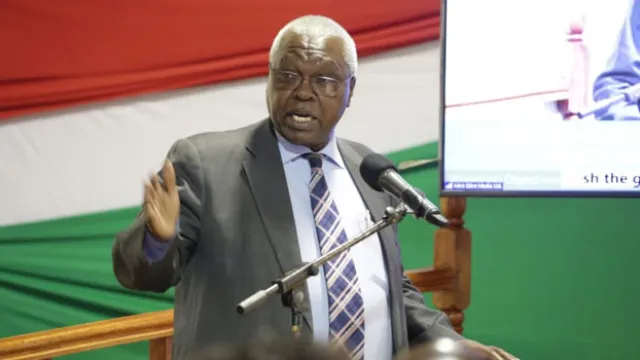When a name can keep you alive

When a name can keep you alive
“I am alive today because of my name. Three of my elder brothers died at birth in Kikambuani. So just before I was born, my parents did consultations and they were told the only way I would survive was by among others, my mother giving birth from a different spot from where she gave previous births, and… give the baby a ‘very bad name’. And that’s why I was called Muatine so that the gods will not be attracted to me, and that’s why I’m alive today.”
Above is the account of Raphael Muatine Munavu, a Professor of Chemistry and Historian, who firmly contends that he has no basis to deny that his parent’s tough choices in the period leading to his birth were not correct.
With modernity and our fast-fading grasp of traditional cultural issues, I found Prof Munavu’s account of Kamba culture in a Youtube compilation cutting across various issues including health very illuminating.
The short documentary, which is associated with Uwezo College, School of Culture and Social Studies, will also see you pick valuable lessons on culture amid changing societal norms from linguistics scholars Prof Kithaka wa Mberia and Prof Angelina Nduku; US-based historian Prof Jeremiah Kitunda as well as poet and author Professor David Mailu.
Among the Kamba community, Kenya’s traditional long-distance traders, muatine is the local name of the Sausage tree and the word is also used when referring to the tribe’s traditional beer (muatine), which was brewed from sugarcane juice, muatine fruits, and honey. But unlike today where abuse of the beverage is on an industrial scale, muatine was only taken by old men during ceremonies and leisure time.
But it was by getting the ‘bad name’ muatine when he was born that Prof Munavu got saved—literally—from the cruel hand of death that had already snatched away three of his elder brothers upon birth leaving his parents crestfallen and woefully devastated.
The account of the chemistry scholar is very similar to the experience of Prof Kithaka wa Mberia, his language and linguistics colleague at the University of Nairobi.
“My name is Kithaka wa Mberia. Kithaka is not my original name. I got the name Kithaka from the family traditional doctor because I used to be sickly and there were so many herbs in my mother’s hut… So, I have much respect for herbalists and diviners. They are perfect. We need to maintain that,” says Prof Kithaka.
Whereas it is pretty hard to pinpoint scientifically why the choice of a name alone could spell doom and death or life and survival for a newborn soul, credit goes to age-old cultural practices that effortlessly ensured communities remain healthy, assuring the society growth.
Read also: Sex of markets and the birth of Swahili
In Western countries, Prof Munavu argues, similarities exist in how ancient communities as well as modern ones, manage diseases and emerging health complications.
“In our culture, for somebody who is sick but we don’t understand where the disease came from, we say he has been bewitched. To be cured, we go to a witch doctor. In the Western context, there are some diseases that are very difficult and you go to a psychologist or psychiatrist who just discusses with you and says that he understands you and so on and tells you do this or that, behave this way and your disease will disappear,” says Prof Munavu.
Before the advent of modern medicine, each clan among the Kalenjin, a Nilotic community that resides in Kenya’s Rift Valley, had its own traditional healer who provided medicine to clan members. Traditional healers used herbal extracts, massages, and spiritual healing to treat a myriad of diseases.
Among the Maasai, traditional healers or Laibons played a critical role in the community health care system by offering diagnosis, traditional remedies, and counseling. They were the community's intermediaries with the spiritual world and were highly respected and feared.
In Luoland, legend has it that traditional healers had this medicine that once administered, one would see the excruciating pain associated with toothache disappear and void the need to ever consider uprooting it. Even today, dentists in Luoland still send their patients to such medicine men.
“If you get sick today, you go to buy drugs from the pharmacist but where did those drugs come from? They came from our traditional, indigenous culture,” explains Prof Munavu.
Circumcision of men is also another cultural practice among communities in Kenya that has received accolades from health experts for helping in the fight against the spread of HIV and Aids, a disease affecting just over 1.5 million people in Kenya.
Increasingly, health experts have been calling on men–young and old–to embrace the cut as one of the means helping check the spread of Aids scourge.
The benefits notwithstanding, US-based historian Prof Jeremiah Kitunda says circumcision was not a core part of Kamba culture since the times of yore.
“Originally Kamba were not circumcising. We learned that from Tharaka and Mbeere and the latter said it was the Maasai who showed them how to cut when they met in the neighbourhood of Ruiru,” Prof Kitunda says adding that is subject to argument.
“Some sections of the Kamba argue that they borrowed the practice from Mt Kenya area or further South. And so, we changed from people, who were not into circumcision to people who are very devoted to cutting, he explains denoting the exchange and sharing of cultural knowledge that went on among ancient communities.
Interestingly, whereas all these communities started circumcising both men and women, Female Genital Mutilation has over the years been discouraged, including through the rollout of tough laws owing to the overwhelming health risks associated with the cultural practice.
“We have embraced the practice of condemning it (FGM). Change is inevitable,” adds Prof Kitunda.
Additional reporting by Erick Kibet, Dredan Njau and Serena Ndekeremo.



